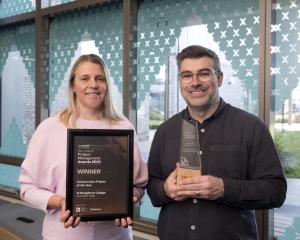The odds were stacked against them, but three males from three generations of one family celebrated their birthday yesterday.
So what were the odds of Andy Reeve, son Shane and grandson Levi, of Dunedin, having a birthday on the same day.
Yesterday's report in the Otago Daily Times about the milestone caused some confusion so we asked King's High School teacher Jesse Farry to clarify his numbers.
The chances of three males from three generations of one family being born on the same day is one in 194 million.
The figure 1 in 48,627,125 assumes that they had to be born on the exact day, March 30, and no other day would do. The chances of a son and grandson both being born on the same day as the father/grandfather (any day) is 1 in 133,225.
How to work it out:The grandfather is born on any day. 100% chance he is born, i.e. it doesn't matter what day he is born.
Chance a son is born on same day is 1 in 365 (1/365). (Event A).
Chance a grandson born on same day as grandfather (regardless of his father) is 1 in 365. (Event B).
Chance of events A and B both happening is 1/365 x 1/365, or (1/365)2 = 1/133225.
If you really want to specify the day, then there is also a 1/365 chance that the grandfather is born on that day and the probability becomes (1/365)3 = 1/48,627,125. This number is meaningless in a way, unless you are considering a special day, like Christmas.
The odds of all being the same sex is four times lower (i.e. 4 x 133,225 = 532,900).
The odds of all being male is eight times lower (i.e. 8 x 133,225 = 1,065,800).
If you specifically care about the day, then the probability for all the same sex (doesn't matter which) is 1 in 4 x 48,627,125 which equals 194,508,500.
If it has to be male then it's 1 in 8 x 48,627,125.
Mr Farry also acknowledged a leap year would make the figures different as well.












